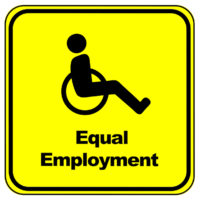EEOC Claims Employee Was Denied A Reasonable Accommodation For His Disability

Having represented employment discrimination victims for nearly twenty years, our Marion County, Florida employment discrimination attorneys have learned that employers often refuse to provide disabled employees with a change at work due to a medical condition. Under the Americans with Disabilities Act (ADA), an employer unlawfully discriminates against an employee by failing to make reasonable accommodations to the known physical or mental limitations of an individual with a disability. Thus, the ADA establishes a cause of action for disabled employees whose employers fail to reasonably accommodate them.
The U.S. Equal Employment Opportunity Commission (EEOC) recently announced that it has filed a disability discrimination lawsuit against Goodwill Industries of New York & New Jersey (Goodwill) pursuant to the ADA. On March 25, 2018, the EEOC filed the lawsuit, EEOC v. Goodwill Industries of New York & New Jersey, Case No. 1:19-cv-1674, in the U.S. District Court for the Eastern District of New York after initially attempting to reach a pre-litigation settlement through its statutorily mandated conciliation process. The EEOC has brought the disability discrimination lawsuit on behalf of a former employee of Goodwill, Robin Hawker (Hawker). In this article, our Marion County, Florida employment discrimination lawyers explain the EEOC’s allegations against Goodwill.
EEOC’S Allegations Of Disability Discrimination
Hawker was referred to Goodwill for employment by WeCARE, a program that provides services to disabled welfare recipients. As part of its referral to Goodwill, WeCARE provided Goodwill with medical records describing Hawker’s cognitive disability, which substantially limits him in the major life activities of thinking, speaking, reading, and interacting with others, and recommended that Hawker work in a low stress environment. Hawker was hired by Goodwill as a janitor in July 2016. Hawker was assigned to clean buildings occupied by the New York City Human Resources Administration (HRA).
The EEOC claims that Hawker received minimal training and direction about how to do his job. When Hawker was hired, according to the EEOC, his training consisted solely of instruction on how to clean bathrooms and operate cleaning machinery. Hawker did not receive any training about how to interact with HRA employees. Hawker was told only that his supervisor would instruct him on how to do his job. Hawker’s supervisor had received no special training on how to work with individuals with a disability.
In September 2016 and November 2016, Hawker received written warnings because of his interactions with HRA employees. Hawker notified his supervisor that he was unable to read or understand the written warnings and needed someone to explain them to him. Other than instructions not to enter occupied rooms without permission, Goodwill did not provide Hawker with any additional training about how to interact with HRA employees or how to do his job while HRA employees were in the building.
The EEOC contends that based on its knowledge of Hawker’s cognitive disability, Goodwill knew that Hawker needed additional training or to be transferred to a location that required less interaction with HRA employees in order to continue to perform the essential functions of his job. Despite such knowledge, the EEOC maintains, Goodwill failed to provide Hawker with a reasonable accommodation that would allow him to continue to perform the essential functions of his job. For example, Goodwill did not provide Hawker with extra training or transfer Hawker to a different location that would have required less interaction with HRA employees.
In January 2017, Goodwill fired Hawker based on an incident involving his interaction with HRA employees. The EEOC claims that Goodwill’s failure to provide Hawker with a reasonable accommodation caused his termination. For example, the EEOC argues, if Goodwill had accommodated Hawker’s disability by providing him with additional job training, Goodwill would never have had any reason to fire Hawker. Similarly, the EEOC maintains, if Goodwill had transferred Hawker to a different location that would have required less interaction with HRA employees, Goodwill would never have had any reason to fire Hawker.
EEOC Protects Rights Of Disabled Employees
The EEOC is the administrative agency of the United States responsible for interpreting and enforcing federal laws prohibiting employment discrimination. The EEOC is also authorized by federal law to bring lawsuits on behalf of victims of employment discrimination, including disability discrimination. In a press release issued by the EEOC regarding the case, a trial attorney for the EEOC, Sebastian Riccardi, stated that “[a]n employer cannot simply ignore an employee’s need for a reasonable accommodation of a disability.” “The ADA requires that the employer engage in an interactive process with the employee,” Mr. Riccardi added, “to determine if there is a way to accommodate the employee’s disability and allow the employee to continue doing his job and earn a living.”
Free Consultation With Ocala Discrimination Lawyers
Based in Ocala, Florida and representing employees throughout Central Florida, we have represented employment discrimination victims in hundreds of cases before the EEOC. If you have been discriminated against on the basis of disability or have questions about your right to a reasonable accommodation for a disability, please contact our office for a free consultation with our Marion County, Florida employment discrimination attorneys. Our employment and labor law attorneys take employment discrimination cases on a contingency fee basis. This means that there are no attorney’s fees incurred unless there is a recovery and our attorney’s fees come solely from the monetary award that you recover.
